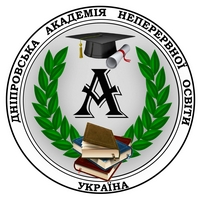INDIVIDUAL STROKES AND TRENDS OF HUMANISTIC DEVELOPMENT EDUCATION PARADIGMS IN THE CONTEXT OF CHANGING THE MANAGEMENT VECTOR
Abstract
The article is devoted to the analysis of scientific achievements on the development of the humanistic paradigm of education, the study of new trends and touches in its development in modern conditions. In particular, the genesis of the formation of the humanistic paradigm of education is briefly traced. The urgency of the problem under study, which becomes critical, is emphasized, since today, as ever, the priority of a human -centrist approach and the need to form democratic values in education applicants. The analysis of scientific achievements demonstrates great attention to scientists to substantiate the structure and content of the humanistic paradigm of education. The essence of the term "paradigm" is considered in terms of different sciences, which confirms different views of scientists on the characteristics of the paradigm and its classification. The purpose of the article is to consider the tendencies and individual characteristic strokes of the humanistic paradigm of education, to distinguish its influence on the development of the personality of education, the study of advantages, and the warning of the humanistic paradigm at the present stage. The following trends in the development of a humanistic paradigm that influence the content and quality of the educational process in the higher education institution are considered: priorities of humanistic educational policy; reflection of reforms in strengthening the humanistic aspect of education in the normative legal bases of education; expanding the rights and responsibilities of consumers of educational services as a characteristic of the humanistic paradigm of education, the use of ideas of postmodern pedagogy in the educational process; strengthening of social responsibility of management entities; outline the humanistic management vector; digitalization of the educational space of a higher education institution. The advantages and warnings of the development of the humanistic paradigm of education are highlighted in the context of its special characteristics: reflexive approach, human-centric approach, competent approach, subjective-subjective interaction in educational and management processes, axiological context of educational process, academic education, academic freedom, academic freedom, academic freedom of education, academic freedom of education. Integration of the emotional and cognitive component in the educational process, reorientation of the outlook of the personality of the applicant's personality to humanistic values, orientation of educational systems on the formation of traits of humanity personality of education, developmental humane environment, emphasis on self -education and self -development of personality. The prospects of further exploration may be the study of the impact of the humanistic paradigm on the system of education of the personality of the applicant of education and the development of criteria for evaluating such influence.
References
2. Барановська О.В. Гуманістична парадигма фундаменталізації навчання у змісті освіти сучасної школи. Сайт лабораторії дидактики Інституту педагогіки НАПН України 2013.
3. Вознюк О.В. Нова парадигма моделювання та розвитку історико-педагогічного процесу: монографія. Житомир: Вид-во ЖДУ ім. І. Франка, 2014 550 с.
4. Про вищу освіту. Закон України від 1 липня 2014 року № 1556-VII URL: https://zakon.rada.gov.ua/laws/show/1556-18#Text
5. Лещук Г.В., Сорока О.В. Освітня парадигма суспільства знань. Парадигмальні виклики сучасного розвитку: колективна монографія за загальною редакцією Дуки А. П. Чернігів: ГО «Науково-освітній інноваційний центр суспільних трансформацій», 2022. С. 156–169.
6. Мельник Н.І. Гуманістична парадигма освіти як умова ефективної організації інклюзивної освіти в Україні. Вісник психології і педагогіки. Збірник наукових праць. 2012, 9. URL: https://www.psyh.kiev.ua
7. Попова О. Гуманістична парадигма як основа формування емпатійної культури майбутнього вчителя музичного мистецтва. О. В. Попова, Лі Юанці. Мистецька освіта у міждисциплінарному вимірі: матеріали ІІ Всеукр. наук.-практ. конф. з міжнар. участю, Харків, 13–14 черв. 2023 р. Харків. нац. пед. ун-т ім. Г. С. Сковороди. Харків: ХНПУ ім. Г.С. Сковороди, 2023. С. 44–47. URL:https://dspace.hnpu.edu.ua/handle/123456789/12028
8. Сірополко C. Історія освіти в Україні: монографія. С. Сірополко; Укр. Вільний Ун-т (м. Мюнхен, Німеччина), Друзі т-ва ім. Г. Ващенка. Київ: Наук. думка, 2001. 911 c. URL: https://surl.lu/dmjkdl
9. Українська дипломатична енциклопедія: у 2 т. Київ. нац. ун-т імені Тараса Шевченка, Ін-т міжнар. відносин; [редкол.: Л. В. Губерський (голова) та ін.]. Київ: Знання України, 2004. Т. 2 . 2004. 797 c.
10. Філософський енциклопедичний словник. НАН України, Ін-т філософії імені Г. С. Сковороди; [редкол.: В. І. Шинкарук (голова) та ін.]. Київ: Абрис, 2002. VI, 742 с.
11. Wise E. 7 Trends in Higher Education 2024: Educational Evolution. Job and Education. Pressmaverick, 2024. URL: https://pressmaverick.com/7-trends-in-higher-education-2024-educational-evolution/?utm_source=chatgpt.com

 ISSN
ISSN  ISSN
ISSN 

